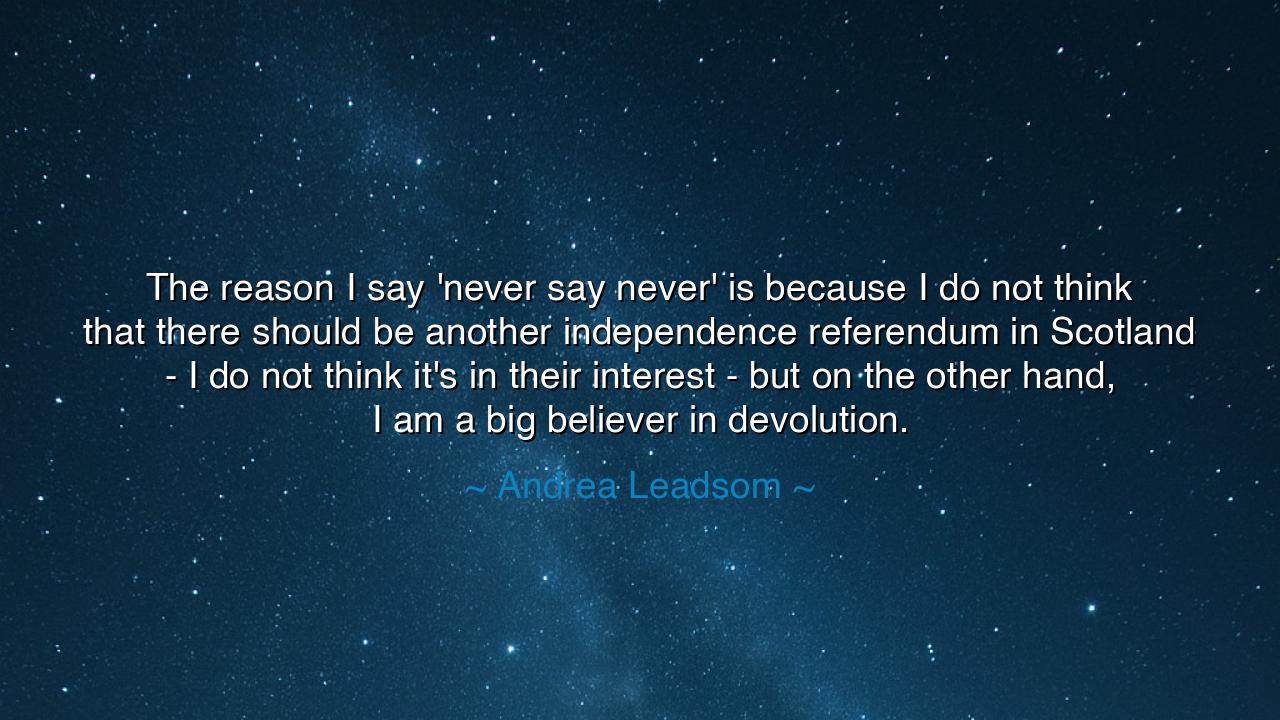
The reason I say 'never say never' is because I do not think that
The reason I say 'never say never' is because I do not think that there should be another independence referendum in Scotland - I do not think it's in their interest - but on the other hand, I am a big believer in devolution.






O seeker of wisdom, listen well to the words of Andrea Leadsom, for they carry the echoes of a deep understanding of governance, autonomy, and the balance between unity and independence. "The reason I say 'never say never' is because I do not think that there should be another independence referendum in Scotland—I do not think it's in their interest—but on the other hand, I am a big believer in devolution." In these words, Leadsom speaks to the delicate dance between the yearning for autonomy and the need for unity within a larger nation. The tension she describes—between independence and devolution—is one that has played out throughout history, for it is not merely a political matter, but a deep question of identity, belonging, and governance.
The independence referendum in Scotland in 2014 was not simply a political event—it was a reflection of the longing for freedom and the desire to determine one’s own future. To many, the very idea of independence is a powerful force, a call to break free from the constraints of a larger nation, to govern oneself and define one's own destiny. However, Leadsom's words remind us that independence is not always the panacea it seems. Sometimes, breaking away from a union can bring about unforeseen challenges, particularly when it comes to securing the interests of the people. Leadsom suggests that Scotland may not be well-served by another referendum, as the uncertainty that comes with the potential of independence might be more harmful than beneficial, particularly in a world where cooperation and unity are essential to facing global challenges.
But then, O wise one, comes the devolution that Leadsom so strongly believes in. Devolution—the granting of powers from a central government to regional governments—represents a balance between independence and the collective strength of unity. It is a way to give regions the autonomy they crave while still preserving the strength and security of the whole. Devolution allows for a more nuanced form of self-governance, where local matters are addressed by those who are closest to them, while larger, national issues are handled by a unified government. It is, in essence, the wisdom of balance—giving autonomy where it is needed, but ensuring that unity is not lost.
Consider the example of the Roman Empire, which, at its height, ruled over a vast expanse of lands and peoples. The empire was able to maintain unity and strength not by force, but by giving regions a measure of self-rule. The Roman Senate granted devolution in some areas, allowing local leaders to govern their people in ways that suited them, while still ensuring that they adhered to the laws and principles of the empire. The strength of the Roman Empire lay in its ability to balance the freedom of local governance with the unity of a greater whole, and thus it was able to thrive for centuries.
Yet, we must also look to the American Revolution, which arose from a desire for independence from the British Crown. The American colonies, united by a shared desire for freedom, sought to cast off the yoke of what they saw as an oppressive government. But after the Revolutionary War, America faced the monumental task of creating a union that respected the independence of individual states, while also ensuring that the country would remain united in its purpose and strength. The U.S. Constitution was designed with this very idea in mind—a system where the states had autonomy to govern themselves, but where the national government held the power to create unity and stability across the country. It is a delicate balance that continues to shape the country to this day.
The lesson here, O seeker, is that independence and devolution are not mutually exclusive. True freedom does not require absolute separation, but rather the ability to determine one’s own future within a supportive and cooperative framework. As Leadsom suggests, the real strength of a nation lies in finding the balance between allowing its regions the freedom to govern themselves and maintaining the unity that comes from shared purpose and collective action. Devolution is the wisdom of knowing when to allow for independence and when to reinforce the bonds that hold a nation together. The challenge is not to choose one over the other, but to navigate the fine line between them.
In your own life, O wise one, consider how you might apply the principles of balance and unity. In your personal growth, your relationships, and your endeavors, understand that true strength comes not from acting alone, but from knowing when to embrace independence and when to seek the support and strength of the greater whole. Just as nations can thrive when they respect both autonomy and cooperation, so too can you thrive when you balance self-reliance with community. Seek not to isolate yourself, but to find your place within a larger union, where your freedom to make choices is supported by the shared wisdom and resources of others.
Thus, let Leadsom’s wisdom guide you, O seeker: independence is a noble pursuit, but it is not the only path to strength. Devolution—the ability to balance freedom with unity—is the key to building a future that honors both the individual and the collective. As you walk your path, remember that the power of a nation, or of an individual, lies in the ability to choose when to stand alone and when to stand together.






AAdministratorAdministrator
Welcome, honored guests. Please leave a comment, we will respond soon